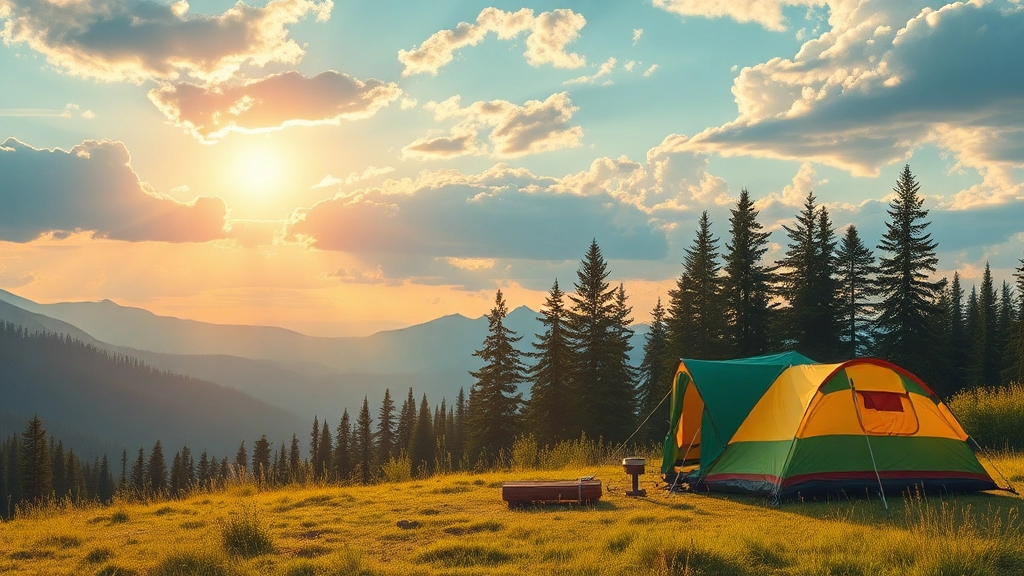Summer Camping: A Unique Opportunity
Summer camping offers a unique opportunity to reconnect with nature, unwind, and create unforgettable memories. This article dives into essential aspects of summer camping, from choosing the perfect destination to capturing the best moments. Whether you’re a seasoned camper or a first-timer, these tips and insights will help you plan a successful and enjoyable trip.
What to Expect
We’ll explore everything from must-have gear and safety tips to fun activities and eco-friendly practices. Learn how to keep your kids entertained, prepare delicious meals, and stay comfortable despite unpredictable weather. Get ready to embark on a summer camping adventure that’s both memorable and sustainable.
Choosing the Perfect Summer Camping Destination
So, you’re itching to get out there and soak up the summer vibes, but where should you pitch your tent? Choosing the perfect summer camping destination can feel like finding a needle in a haystack. Summer camping destinationâlet’s nail it down.
What Do You Want from Your Summer Camping Destination?
Ask yourself: What’s the dream here? Are you craving mountains, lakes, or a beachside retreat? Think about:
- Nature: Do you want to be surrounded by lush forests or open plains?
- Activities: Are you into hiking, fishing, or just chilling by the campfire?
- Crowds: Do you prefer solitude or a lively campground atmosphere?
Top Tips for Picking Your Spot
Research and Reviews
- Online Communities: Dive into camping forums and social media groups for insider tips.
- Reviews: Check out sites like TripAdvisor for honest feedback from fellow campers.
Accessibility
- Distance: How far are you willing to drive? Consider fuel costs and travel time.
- Facilities: Do you need amenities like toilets and showers, or are you going full Bear Grylls?
Personal Story: My First Camping Mishap
Let me tell you about my first camping trip. I picked a spot based on a friend’s recommendationâbig mistake. It was beautiful but miles from any facilities. Lesson learned: always check the amenities!
Consider the Weather
- Temperature: Is it going to be blazing hot or comfortably warm?
- Rainfall: Check the forecast to avoid a soggy disaster.
Wildlife and Safety
- Wildlife: Know what animals are in the area and how to handle encounters.
- Safety: Is the area known for any natural hazards?
Destination Ideas to Get You Started
- Lake District: Perfect for water activities and stunning views.
- Scottish Highlands: For those who love dramatic landscapes.
- Cornwall Beaches: Ideal for a seaside escape.
If you’re looking for more adventure, consider checking out some of the top 10 exciting summer camp activities to make your trip even more memorable. And don’t forget to pack right! Our ultimate packing guide has got you covered.
Essential Gear for a Successful Summer Camping Trip
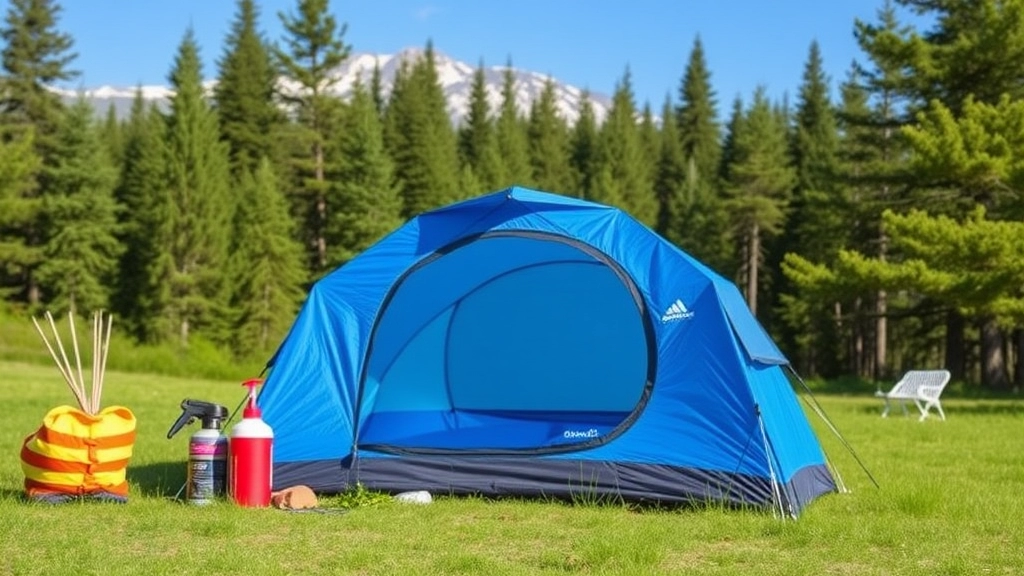
Ever thought, “What if I forget something crucial for my camping trip?”
You’re not alone.
Choosing the right gear can make or break your summer camping experience.
Let’s dive in.
Must-Have Camping Essentials
First up, tent.
You need a tent that’s easy to set up and can withstand summer weather.
Look for one with good ventilation to keep cool.
Sleeping bags are next.
Even in summer, nights can get chilly.
Opt for a lightweight sleeping bag that’s rated for summer temperatures.
Sleeping pads or air mattresses are a game-changer.
They add comfort and insulation from the ground.
Cooking Gear
You can’t survive on granola bars alone.
A portable camping stove is essential.
Make sure it’s compact and easy to use.
Don’t forget fuel canisters.
A cooler is vital for keeping food fresh.
Choose one with good insulation.
Pack lightweight cookware: pots, pans, and utensils.
Hydration and Water Filtration
Hydration is key.
Bring a reliable water filter or purification tablets.
A hydration bladder or multiple water bottles can save you trips to the water source.
Clothing and Footwear
Dress in layers.
Summer weather can be unpredictable.
Pack moisture-wicking shirts, lightweight trousers, and a waterproof jacket.
Don’t skimp on footwear.
Good hiking boots or trail shoes are a must.
Safety and Navigation
Always have a first aid kit.
You never know when you might need it.
A map and compass are essential, even if you have GPS.
Tech can fail.
Lighting and Power
A reliable headlamp or flashlight is crucial for navigating in the dark.
Bring extra batteries.
A portable charger can keep your devices powered.
Comfort and Extras
A camping chair can make a huge difference.
Trust me, you don’t want to sit on the ground all day.
A multi-tool is handy for various tasks.
And don’t forget the bug spray.
Mosquitoes can ruin a good time.
Real Talk
I once forgot my sleeping pad on a trip.
Never again.
The ground was hard, and I barely slept.
Lesson learned.
Tips for Staying Safe While Camping in Summer
Alright, so you’ve got your summer camping trip all planned out. But let’s be real, staying safe is a top priority. No one wants their relaxing getaway to turn into a survival story, right? So, what do you need to know to keep yourself and your crew out of trouble?
Stay Hydrated
First things first, stay hydrated. It’s easy to forget to drink water when you’re having fun, but dehydration can sneak up on you. Here’s how to keep those water levels up:
- Carry a reusable water bottle: Make it a habit to sip regularly.
- Electrolyte packets: These are lifesavers when you’re sweating buckets.
- Know your water sources: If you’re camping in a remote area, make sure you have a reliable way to purify water.
Protect Yourself from the Sun
Sunburn and heatstroke are no joke. Here’s how to protect yourself:
- Sunscreen: Apply it generously and reapply often.
- Hats and Sunglasses: These aren’t just fashion statements; they protect you from harmful UV rays.
- Shade: Take breaks in the shade to cool down. A portable canopy can be a game-changer.
Be Prepared for Wildlife
Encounters with wildlife can be thrilling but also dangerous. Here’s how to stay safe:
- Store food properly: Use bear-proof containers or hang food high in a tree.
- Stay alert: Keep an eye out for animal tracks and signs.
- Make noise: Let animals know you’re coming to avoid surprising them.
First Aid Kit Essentials
A well-stocked first aid kit is a must. Here’s what to include:
- Bandages and antiseptics: For minor cuts and scrapes.
- Tweezers: For removing splinters or ticks.
- Pain relievers: For those inevitable headaches or muscle aches.
- Allergy meds: Just in case someone has an unexpected reaction.
Fire Safety
Nothing beats a campfire, but you’ve got to be smart about it:
- Fire rings: Use designated fire rings if available.
- Keep it small: A smaller fire is easier to control.
- Never leave it unattended: Always have someone keeping an eye on the fire.
- Extinguish properly: Make sure the fire is completely out before you go to bed or leave the campsite.
Navigation and Communication
Getting lost is a quick way to ruin your trip. Here’s how to avoid it:
- Maps and Compass: Don’t rely solely on your phone’s GPS.
- Tell Someone: Let someone know your plans and expected return time.
- Two-way Radios: Handy for areas with no cell service.
Insect Protection
Bugs can be more than just annoying; they can carry diseases. Here’s how to keep them at bay:
- Insect repellent: Use one with DEET for the best protection.
- Long sleeves and pants: Especially during dawn and dusk when bugs are most active.
- Mosquito nets: For a peaceful, bite-free sleep.
Personal Stories and Examples
Let me tell you about the time I forgot to pack my sunscreen. We were on a week-long trip, and by day three, I looked like a lobster. Not only was it painful, but it also limited what I could do for the rest of the trip. Lesson learned: never skimp on sun protection.
Another time, we had a close encounter with a curious raccoon. We had left some snacks out, and it was a reminder of how important it is to store food properly. A little precaution goes a long way.
For more ideas on making your camping experience unforgettable, check out our summer camp activities that combine fun and learning.
Fun Activities to Enjoy During a Summer Camping Trip
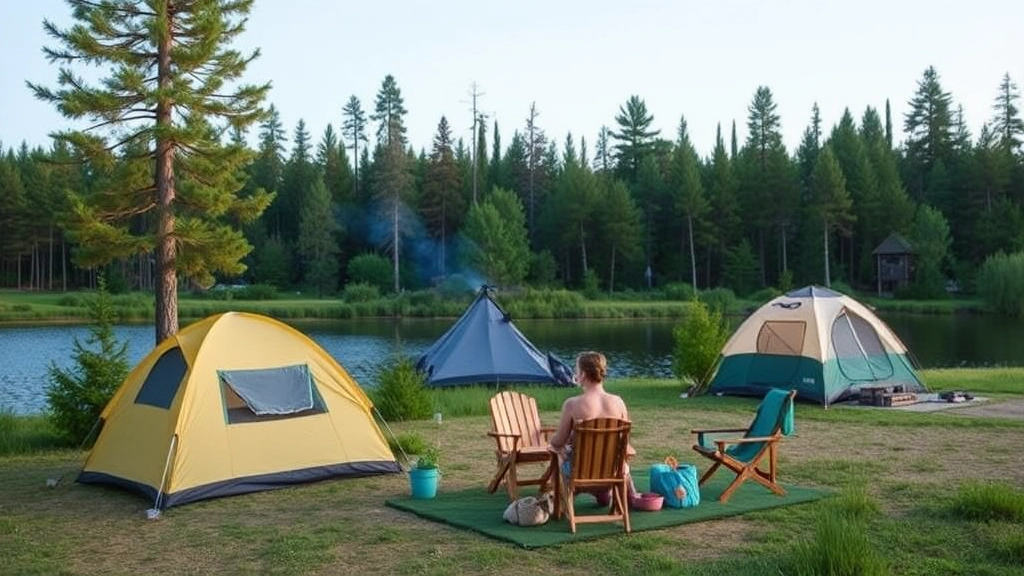
Ever wondered how to keep everyone entertained during a summer camping trip?
You’re not alone.
Choosing the right activities can make or break your adventure.
Here’s the lowdown on fun things to do while camping in the summer.
Hiking and Exploring
First up, hiking.
- Find local trails.
- Use a map or app to stay on track.
- Bring plenty of water.
Hiking is a great way to soak in nature and get some exercise.
Water Activities
Summer means heat, and what better way to cool off than with water activities?
- Swimming in lakes or rivers.
- Kayaking or canoeing.
- Fishing.
Just remember to check if these activities are allowed at your campsite.
Campfire Fun
Nothing beats a good old campfire.
- Roast marshmallows.
- Tell ghost stories.
- Sing campfire songs.
These are classic activities that never get old.
Stargazing
When’s the last time you looked up at the night sky?
Stargazing is a must.
- Bring a telescope or binoculars.
- Use a stargazing app.
- Lay on a blanket and just watch.
The stars are clearer away from city lights, making it a magical experience.
Games and Sports
Pack some games and sports equipment.
- Frisbee or football.
- Board games or card games.
- Scavenger hunts.
These are perfect for keeping both kids and adults entertained.
Wildlife Watching
Ever tried wildlife watching?
- Bring binoculars and a camera.
- Make a checklist of animals to spot.
- Stay quiet to avoid scaring them off.
It’s like a live-action nature documentary.
Relaxation
Sometimes, the best activity is doing nothing.
- Read a book.
- Nap in a hammock.
- Meditate.
Relaxing in nature can be incredibly rejuvenating.
Crafting
Finally, get creative with some crafting.
- Make friendship bracelets.
- Create nature art with leaves and rocks.
- Try painting or drawing.
Crafting can be a fun way to pass the time and create souvenirs.
Best Practices for Camping with Kids in Summer
Worried about camping with kids in summer? You’re not alone. Many parents wonder how to keep their little ones safe, entertained, and comfortable. Let’s dive into some practical tips to make your family camping trip a smashing success.
Plan Ahead and Get the Kids Involved
Kids love being part of the action. So, involve them in the planning process. This not only gets them excited but also helps them understand what to expect.
- Choose a Kid-Friendly Campsite: Look for campsites with amenities like playgrounds, swimming areas, and easy hiking trails.
- Pack Together: Let the kids help pack their own bags. This teaches responsibility and ensures they bring along their favourite comfort items.
- Create a Checklist: A visual checklist can help kids keep track of their own gear and tasks.
Safety First: Keep the Kids Safe and Sound
Safety is a top concern for any parent. Here are some straightforward tips to keep your kids safe during your summer camping trip:
- First Aid Kit: Always have a well-stocked first aid kit. Include items like bandages, antiseptic wipes, and any necessary medications.
- Sun Protection: Pack plenty of sunscreen, hats, and sunglasses. Make sure the kids apply sunscreen regularly.
- Hydration: Keep them hydrated. Kids can get dehydrated quickly, especially in the summer heat. Carry plenty of water and encourage regular water breaks.
- Bug Protection: Use child-friendly insect repellent and consider bringing along some citronella candles for the campsite.
Keep the Fun Rolling: Activities for Kids
Keeping kids entertained is crucial. Bored kids can quickly turn a fun trip into a stressful one. Here are some engaging activities:
- Nature Scavenger Hunt: Create a list of items for the kids to find around the campsite. This keeps them busy and teaches them about nature.
- Campfire Stories and Songs: Nothing beats a good story or song around the campfire. Get the kids involved in telling their own tales.
- Outdoor Games: Bring along some simple outdoor games like frisbee, badminton, or a football.
- Crafts with Nature: Collect leaves, rocks, and sticks to create art projects. This is a fun way to explore and appreciate nature.
Comfort is Key: Make the Campsite Kid-Friendly
A comfortable campsite can make all the difference. Here’s how to set up a kid-friendly camping area:
- Comfortable Sleeping Arrangements: Ensure they have a good sleeping bag and a comfy sleeping pad. A good night’s sleep is essential.
- Kid-Sized Gear: Use kid-sized camping chairs and utensils. This makes them feel more at home and comfortable.
- Safe Play Area: Set up a designated play area where they can run around safely.
Capture the Moments: Make Memories Together
Camping with kids can create some of the most cherished family memories. Here’s how to make sure you capture those special moments:
- Photo Diary: Give each kid a disposable camera or let them use a smartphone to take pictures. This can be their personal photo diary of the trip.
- Journal: Encourage them to keep a camping journal. They can write about their favourite activities, draw pictures, or press flowers and leaves.
- Family Scrapbook: After the trip, create a scrapbook together. This is a wonderful way to relive the memories and bond as a family.
Camping with kids in summer can be a blast if you’re well-prepared and keep things simple. Remember, the goal is to enjoy the great outdoors and make lasting memories. So, pack smart, stay safe, and have fun!
Preparing Meals and Snacks for Summer Camping
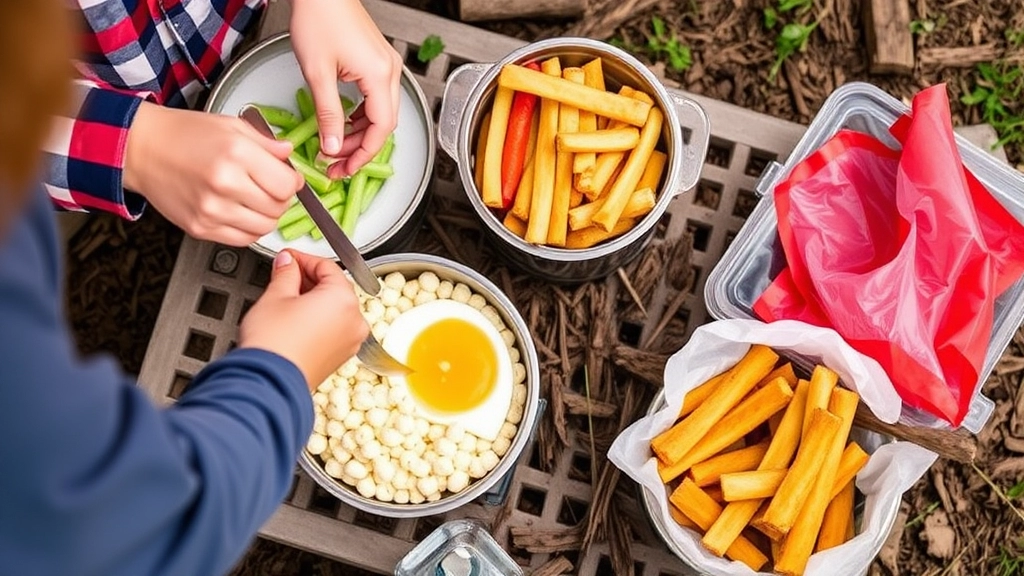
Ever wonder how to keep everyone fed and happy on a summer camping trip?
We’ve all been there—trying to figure out what to pack without hauling the entire kitchen.
Let’s get into it.
Why is Meal Prep Important for Camping?
You don’t want to be stranded with nothing but a bag of crisps.
You need energy for those hikes and swims.
Plus, good food makes everything better.
Easy Meal Ideas for Camping
Think simple, tasty, and easy to cook.
Here’s a quick list:
- Breakfast: Instant oats or pancakes. Just add water and you’re good to go.
- Lunch: Wraps or sandwiches. Easy to make, easy to eat.
- Dinner: Foil packet meals. Toss in some veggies and meat, wrap it up, and cook over the fire.
Snack Time Essentials
Snacks are your best friend.
Keep them handy for those mid-day munchies.
- Trail Mix: Nuts, seeds, and a bit of chocolate.
- Fruit: Apples and bananas travel well.
- Jerky: Protein-packed and satisfying.
Cooking Gear You’ll Need
Don’t overpack, but don’t underpack either.
Here’s the sweet spot:
- Portable Stove: For when the campfire isn’t an option.
- Cookware: A pot, a pan, and a spatula. Keep it minimal.
- Cooler: To keep perishables fresh.
Real Tips from My Camping Adventures
I once forgot the salt.
Trust me, it makes a difference.
Here’s what I’ve learned:
- Plan Ahead: Make a meal plan and stick to it.
- Prep at Home: Chop veggies and marinate meats before you leave.
- Stay Organised: Use labelled bags for ingredients.
Sustainable Eating Practices
Leave no trace, right?
Here’s how:
- Reusable Containers: No single-use plastics.
- Biodegradable Soap: For washing up.
- Local Produce: Support local and reduce your footprint.
Sustainable Camping: Eco-Friendly Practices for Summer
Ever wondered how to enjoy the great outdoors without leaving a negative mark? Sustainable camping is the way to go. We all love nature, and it’s our job to keep it pristine for future generations. Here are some practical tips to make your summer camping trip eco-friendly and enjoyable.
Why Should We Care About Sustainable Camping?
First off, let’s address the big questions: Why should we even bother with sustainable camping? What’s in it for us? Well, it’s simple. We want to keep those stunning landscapes just as beautiful for our next trip and for others too. Plus, it feels good to know you’re doing your bit for the planet.
Eco-Friendly Camping Gear
When it comes to gear, think sustainability. Here’s a quick list of eco-friendly camping essentials:
- Solar-powered gadgets: Ditch the batteries and go solar for lights and chargers.
- Reusable containers: Say no to single-use plastics. Pack your food and drinks in reusable containers.
- Biodegradable toiletries: Use soaps and shampoos that won’t harm the environment.
- Eco-friendly tents and sleeping bags: Look for gear made from recycled or sustainable materials.
Leave No Trace Principles
This is the golden rule of sustainable camping. Follow these Leave No Trace principles to minimise your impact:
- Plan ahead and prepare: Know the regulations and special concerns for the area you’ll visit.
- Travel and camp on durable surfaces: Stick to trails and established campsites.
- Dispose of waste properly: Pack it in, pack it out. Simple as that.
- Leave what you find: Don’t take anything from nature except photos.
- Minimise campfire impact: Use a camp stove instead of a fire, or keep fires small and use established fire rings.
- Respect wildlife: Observe animals from a distance and never feed them.
- Be considerate of other visitors: Keep noise levels down and respect others’ space.
Sustainable Food Practices
Eating sustainably while camping is easier than you think. Here are some tips:
- Local and organic: Buy local produce and organic foods to reduce your carbon footprint.
- Bulk up: Purchase food in bulk to cut down on packaging waste.
- DIY snacks: Make your own trail mix or energy bars to avoid single-use packaging.
- Campfire cooking: Use a portable stove instead of a fire for cooking to reduce firewood consumption.
Water Conservation
Water is precious, especially in the wild. Here’s how to conserve it:
- Bring a water filter: Instead of carrying loads of bottled water, use a portable water filter.
- Short showers: If you have to shower, keep it short. Better yet, use biodegradable wipes.
- Reuse water: Use leftover water from cooking to douse your campfire or wash dishes.
Real Stories, Real Impact
I remember a trip to the Lake District where we followed these sustainable practices. We left the campsite exactly as we found it, and it felt incredibly rewarding to know we didn’t leave a trace. Plus, the local wildlife seemed more vibrant and active, probably because we respected their space.
Weather Considerations for Summer Camping
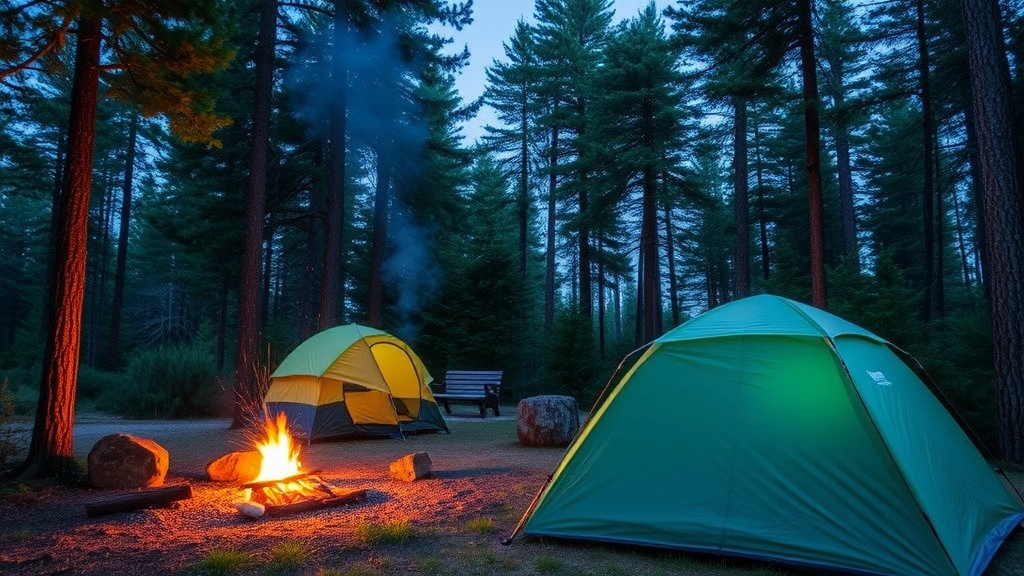
Ever worry about the weather ruining your summer camping trip?
I get it.
Summer weather can be unpredictable.
One minute it’s sunny, the next, a downpour.
So, how do you prepare?
Let’s break it down.
Understanding Summer Weather Patterns
Knowing what to expect is half the battle.
- Check the Forecast: Always check the weather forecast before you head out.
- Local Climate: Research the local climate of your camping destination.
- Temperature Swings: Be ready for hot days and cool nights.
Packing for Weather Changes
Here’s where smart packing comes in.
- Layer Up: Pack lightweight layers. Easy to add or remove as needed.
- Rain Gear: A good waterproof jacket is a must.
- Sun Protection: Sunscreen, hats, and sunglasses are non-negotiable.
Handling Unexpected Weather
What if the skies open up?
Stay calm.
Here’s what you do:
- Shelter: Make sure your tent is waterproof and well-pitched.
- Stay Dry: Keep wet clothes away from dry gear.
- Plan B: Have indoor activities ready for rainy days.
Real Stories, Real Solutions
Once, I was caught in a sudden storm.
The tent held up, but I learned the value of a good rain jacket.
It’s these little lessons that make a difference.
Check out our other tips on Staying Safe While Camping and Creating a Comfortable Camping Setup to enhance your trip further.
Creating a Comfortable Camping Setup
Ever been on a camping trip where you couldn’t get a wink of sleep? Or maybe you were constantly swatting away bugs? Yeah, not fun. Creating a comfortable camping setup can make or break your summer camping experience. So, let’s dive into how you can make your outdoor adventure as cosy as your living room.
Finding the Right Campsite
First things first, location is everything. Look for a campsite that:
- Offers shade: Trees can be your best friends, offering shelter from the scorching sun.
- Is flat and dry: A level ground ensures a good night’s sleep and keeps you dry.
- Has good drainage: This is crucial to avoid waking up in a puddle if it rains.
The Perfect Tent Setup
Your tent is your home away from home, so let’s get it right:
- Size matters: Choose a tent that fits your group comfortably. If you’re a family of four, go for a six-person tent for extra space.
- Ventilation: Look for tents with mesh windows and vents to keep the air flowing.
- Easy setup: Practice pitching your tent at home. Trust me, you don’t want to be fumbling with poles in the dark.
Sleeping Arrangements
A good night’s sleep is non-negotiable:
- Sleeping bags: Go for ones with appropriate temperature ratings. Summer nights can be chilly.
- Sleeping pads or air mattresses: These add a layer of comfort and insulation from the cold ground.
- Pillows: Yes, bring your pillow from home. It makes a world of difference.
Keeping Bugs at Bay
Nothing ruins a camping trip faster than a swarm of mosquitoes:
- Bug spray: Pack a good bug repellent and use it religiously.
- Mosquito netting: Consider a tent with built-in netting or bring a separate net for extra protection.
- Citronella candles: These can help keep bugs at bay while adding a bit of ambience.
Staying Organised
A cluttered campsite is a stressful campsite:
- Storage bins: Use clear plastic bins to keep your gear organised and easily accessible.
- Hanging organisers: These are great for keeping smaller items like keys, torches, and snacks within reach.
- Camp kitchen setup: A folding table and portable stove can make meal prep a breeze.
Camp Furniture
Comfortable seating is a game-changer:
- Camp chairs: Invest in good-quality, foldable chairs with cup holders.
- Hammocks: Perfect for lounging and taking in the scenery.
- Portable tables: Handy for meals and games.
Lighting
Don’t let the setting sun end your fun:
- Headlamps and torches: Essential for navigating in the dark.
- Lanterns: Great for illuminating your campsite.
- String lights: Add a touch of magic and make your campsite feel like home.
Personal Touches
Make your campsite uniquely yours:
- Rugs: A small outdoor rug can make your tent feel more homely.
- Decorations: Fairy lights, flags, or even a small plant can add character.
- Comfort items: Bring a favourite blanket or a book to make your stay more enjoyable.
Real-Life Example
Last summer, my family and I camped at a site near a lake. We found a spot with ample shade and set up our tent on a flat, grassy area. We brought along our air mattresses and pillows from home, which made sleeping under the stars incredibly comfortable. With our bug spray and citronella candles, we enjoyed our evenings without a single mosquito bite. And let me tell you, those fairy lights we strung up? They added a magical touch that made our campsite the envy of the entire campground.
For more tips on creating the perfect camping experience, check out our guide to capturing stunning summer camping photos and our top tips and gear essentials for summer camping.
Capturing the Best Summer Camping Memories
Ever worried about forgetting those epic summer camping moments?
Let’s make sure you capture them all.
Why Capture Memories?
Memories fade, but photos last.
You want to look back and feel the sun, hear the laughter, right?
Essential Gear for Capturing Memories
Keep it simple.
- Smartphone or Camera: Your trusty sidekick.
- Tripod: For steady shots.
- Power Bank: No juice, no pics.
- Waterproof Case: Because accidents happen.
Tips for Stunning Photos
You don’t need to be a pro.
- Golden Hour: Sunrise and sunset. Magic happens.
- Candid Shots: Capture real moments, not just poses.
- Landscape Mode: Get the whole view in.
- Close-Ups: Details matter, like the morning dew on a leaf.
Sharing Stories Through Video
Sometimes, a picture isn’t enough.
- Short Clips: Capture the vibe.
- Time-Lapses: Show the day’s journey.
- Interviews: Get everyone to share a favourite moment.
Journaling: A Personal Touch
Write it down.
- Daily Logs: What did you see? Feel? Eat?
- Sketches: Draw the landscape.
- Collect Keepsakes: Leaves, stonesâadd them to your journal.
Using Apps to Enhance Memories
Tech can help.
- Photo Editing Apps: Brighten, crop, and enhance.
- Memory Apps: Create albums and slideshows.
- Social Media: Share your adventure with friends.
Creating a Memory Box
Physical keepsakes are gold.
- Collect Souvenirs: A pinecone, a unique rock.
- Print Photos: Make a scrapbook.
- Add Notes: Jot down funny stories.
For more ideas on capturing and preserving your summer camp experiences, check out our summer camp craft ideas and learn about staying cool and comfortable during your adventures.
FAQs on Summer Camping Background
What are the essential items I should pack for a summer camping trip?
Essential items include a tent, sleeping bags, sleeping pads or air mattresses, a portable camping stove, fuel canisters, a cooler, lightweight cookware, a reliable water filter or purification tablets, a hydration bladder or water bottles, moisture-wicking clothing, good footwear, a first aid kit, a map and compass, a headlamp or flashlight, extra batteries, a portable charger, a camping chair, a multi-tool, and bug spray.
What kind of activities can I enjoy during a summer camping trip?
Popular activities include hiking, water activities like swimming, kayaking, or fishing, enjoying a campfire with marshmallow roasting and ghost stories, stargazing, playing games and sports, wildlife watching, relaxing, and crafting.
How should I prepare meals and snacks for a camping trip?
Meal prep is crucial for energy and enjoyment. Easy meal ideas include instant oats or pancakes for breakfast, wraps or sandwiches for lunch, and foil packet meals for dinner. Snacks like trail mix, fruit, and jerky are essential. Pack a portable stove, minimal cookware, and a cooler to keep perishables fresh. Plan ahead, prep at home, and stay organized.
What weather considerations should I keep in mind for summer camping?
Summer weather can be unpredictable, so check the forecast and research the local climate. Be prepared for temperature swings by packing lightweight layers, rain gear, and sun protection. Ensure your tent is waterproof and have a plan for unexpected weather, such as indoor activities for rainy days.
How can I stay hydrated during a summer camping trip?
Bring a reliable water filter or purification tablets, and carry a hydration bladder or multiple water bottles. Staying hydrated is essential, especially during physical activities like hiking.
What should I wear for summer camping?
Dress in layers to adapt to changing weather. Pack moisture-wicking shirts, lightweight trousers, a waterproof jacket, and good hiking boots or trail shoes. Sun protection, such as hats and sunglasses, is also important.
How can I ensure safety during a camping trip?
Always have a first aid kit, a map, and a compass. Even if you have GPS, tech can fail. A reliable headlamp or flashlight with extra batteries is crucial for navigating in the dark.
What are some tips for a comfortable camping experience?
Bring a camping chair to avoid sitting on the ground all day, and a multi-tool for various tasks. Bug spray is essential to keep mosquitoes at bay. Having a good sleeping pad or air mattress can significantly enhance comfort.
How can I enjoy nature while camping?
Engage in activities like wildlife watching with binoculars and a camera, stargazing with a telescope or app, and hiking to explore local trails. Relaxing activities like reading a book, napping in a hammock, or meditating can also enhance your nature experience.
What should I do if unexpected weather occurs?
Ensure your tent is waterproof and well-pitched, keep wet clothes away from dry gear, and have indoor activities ready for rainy days. A good rain jacket can make a significant difference during sudden storms.
References
-
REI’s Family Camping Checklist
-
Backpacker’s Guide to Camping Gear
-
Outside Online’s Camping Gear Checklist

